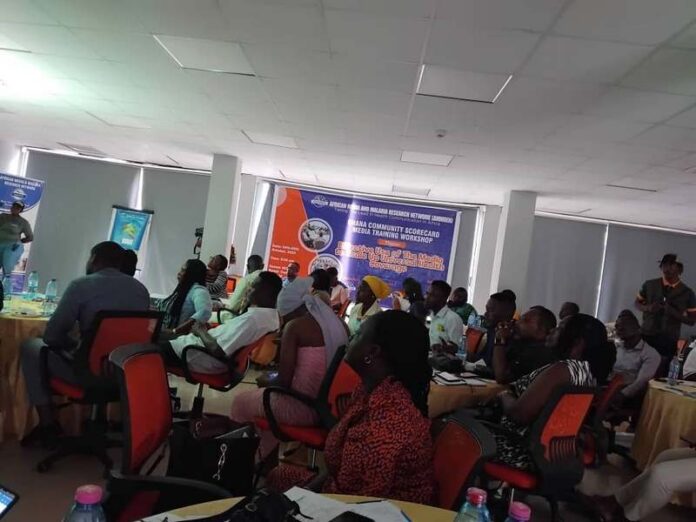Journalists across Ghana are being equipped with the tools and knowledge to play a critical role in enhancing healthcare delivery through the Community Scorecard (CSC) initiative.
Under the theme, “Effective Use of the Media to Scale Up Universal Health Coverage,” the training, organized by the African Media and Malaria Research Network (AMMREN), the Ghana Health Service, African Leaders Malaria Alliance (ALMA), and the Ministry of Health, aims to empower journalists to be key advocates for better health outcomes in the country.
The project is funded by Expertise France as part of ongoing efforts to strengthen community participation in health services.
The selected journalists, after completing the workshop, will be instrumental in disseminating accurate information about the Ghana Community Scorecard to the public. This scorecard serves as a vital tool to track the performance of health services in various communities, promoting transparency and accountability.
Media as the Voice for Better Health Delivery
Dr. Mrs. Charity Binka, Executive Director of AMMREN, emphasized the essential role journalists play in bridging the gap between healthcare providers and the communities they serve.
She pointed out that the current gap in understanding and accessing health services is too wide and that the media has a critical part in closing this divide.
She called on the media to become the “voice” of healthcare, particularly in driving awareness around the Community Scorecard.
According to Dr. Binka, for Ghana to achieve Universal Health Coverage (UHC) by 2030, journalists must be equipped to engage with health-related issues effectively and report on them responsibly.
“There is much work to be done to achieve UHC by 2030,” she stated. “The media must step in, not only to educate the public but to also hold relevant stakeholders accountable for the services provided. Journalists have a unique role in bringing the real issues on the ground to the forefront, ensuring that the public receives the healthcare they deserve.”
Bridging the Gap Through Accountability
Dr. Binka further highlighted the importance of training journalists to immerse themselves in local communities. “Journalists need to be at the forefront, going to the communities, identifying the healthcare challenges, and helping bring healthcare solutions directly to the people’s doorstep,” she said.
“By holding stakeholders accountable, journalists can use the scorecard to rate how well healthcare services are being delivered and expose gaps where improvement is needed.”
The Community Scorecard project is designed to give citizens a voice in evaluating healthcare services in their areas, providing feedback that can influence policy changes and service improvements. Dr. Binka noted that the media’s role is indispensable in ensuring that the findings of the scorecard reach the general public and decision-makers alike.
Empowering Journalists for Action
Divine Kwame Amanieh, Deputy Biostatistic Officer and National CHPS Data Manager at the Policy, Planning, Monitoring, and Evaluation Division of the Ghana Health Service, underscored the importance of the training workshop for both the media and the Ghana Health Service.
He expressed optimism that journalists would leave the workshop better equipped to report on healthcare issues and contribute to improving health service delivery.
“The Community Scorecard is a powerful tool that can enhance healthcare delivery in Ghana. Journalists who are well-informed and skilled in reporting on these issues will be crucial in driving improvements in our health system,” Mr. Amanieh remarked.
As the training continues, it is expected that the journalists will take up the mantle of advocacy, working closely with health officials, communities, and stakeholders to foster a transparent, responsive, and inclusive healthcare system. The ultimate goal is to scale up efforts toward achieving Universal Health Coverage by 2030, ensuring that all Ghanaians have access to quality healthcare services.
The workshop, funded by Expertise France, is a significant step toward making healthcare delivery in Ghana more effective, transparent, and community-focused.
Through their training, journalists will become champions for health, using their platforms to highlight the successes and shortcomings of healthcare services across the country, ultimately contributing to a healthier Ghana.


